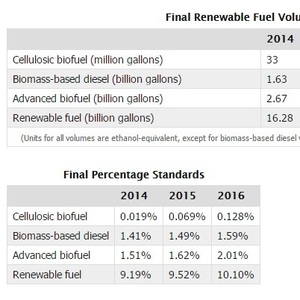Valero asks EPA to redefine RFS definition of obligated party

U.S. EPA
February 22, 2016
BY Erin Krueger
Valero Energy Corp. has filed with a petition for reconsideration with the U.S. EPA, asking it to revise its definition of “obligated party” under the renewable fuel standard (RFS). The company has also petitioned the U.S. Court of Appeals for the District of Columbia to review the agency’s recent RFS rulemaking to set renewable volume obligations (RVOs) for 2014, 2015 and 2016, along with the 2017 RVO for biomass-based diesel.
According to information filed with the court, the Valero is asking the EPA to reconsider defining obligated party as the entity that holds title to the gasoline or diesel fuel, immediately prior to transfer from the truck loading terminal or bulk terminal to a retail outlet, wholesale purchaser-consumer or ultimate consumer, as reflected in the records maintained for federal excise tax purposes. According to the company, making this change will address supply constraints on renewable fuel in the transportation fuel market that impede the market’s ability to respond to renewable fuel volume mandates.
In court filings, Valero notes that it supported EPA’s use of its waiver authority for 2014, 2015 and 2016, but is asking the EPA to take action through redefine obligated party to move the point of obligation so that supply constraints are lifted. The company has asked the EPA to take action on the matter before finalizing 2017 RVOs.
Regarding the petition for reconsideration, Valero joins a wide variety of biofuel and petroleum groups in challenging the RFS rulemaking.
Legal challenges against the renewable fuel standard (RFS) continue to be filed by both stakeholders in the biofuels industry and representatives of the oil industry.
Advertisement
On Jan. 8, Americans for Clean Energy, American Coalition for Ethanol, Biotechnology Innovation Organization, Growth Energy, National Corn Growers Association, National Sorghum Producers, and Renewable Fuels Association filed a lawsuit in the U.S. Court of Appeals for the D.C. Circuit challenging the U.S. EPA’s recent RFS rulemaking, which sets volume requirements for 2014, 2015, and 2016, along with a 2017 renewable volume obligation (RVO) for biomass-based diesel. Among other things, the petitioners said they intend to demonstrate that the EPA’s interpretation of its general waiver authority under the RFS statute was contrary to the statute.
“By focusing on fuel distribution capacity and demand rather than supply, and by failing to consider surplus [renewable identification numbers (RINs)] from prior years, the agency erroneously concluded that there was an inadequate supply of renewable fuel to justify a waiver of the levels established by Congress,” said the biofuel and ag groups in the statement, noting they also plan to point out other fundamental flaws and inconsistencies in the government’s rule.
In mid-January, AFPM filed a motion to intervene in the RFS lawsuit filed by the ag and biofuel groups. The American Petroleum Institute filed a similar motion later that month.DuPont, which owns and operates a cellulosic ethanol plant, also filed a motion to intervene on Feb. 5, followed by petroleum-refiner Monroe Energy LLC on Feb. 8.
On Feb. 9, Monroe Energy filed a separate challenge to the RFS rule with the court. The following day, on Feb. 10, AFMP filed a separate petition for review with the court.
On Feb. 11, the American Petroleum Institute joined the legal fight over the program, filing a challenge with the court. In its filing, the API called aspects of the recent RFS rule “arbitrary, capricious, and abuse of discretion, or otherwise not in accordance with law; are in jurisdiction, authority, or limitations; and were adopted without observance of procedure required by law.”
Advertisement
Also on Feb. 11. Alan Refining Krotz Springs Inc., American Refining Group Inc., Calumet Specialty Products Partners L.P., Lion Oil Co., Ergon-West Virginia Inc., Hunt Refining Co., Placid Refining Co. LLC, Wyoming Refining Co., and U.S. Oil & Refining Co. filed a separate lawsuit, petitioning the court to review the RFS rule.
The National Farmers Union filed its challenge to the RFS rule on Feb. 12. On the same date, the National Biodiesel Board also petitioned the court to review the rule. The court has since consolidated the eight of the lawsuits filed to date.
Related Stories
The U.S. EPA on July 8 hosted virtual public hearing to gather input on the agency’s recently released proposed rule to set 2026 and 2027 RFS RVOs. Members of the biofuel industry were among those to offer testimony during the event.
The USDA’s Risk Management Agency is implementing multiple changes to the Camelina pilot insurance program for the 2026 and succeeding crop years. The changes will expand coverage options and provide greater flexibility for producers.
EcoCeres Inc. has signed a multi-year agreement to supply British Airways with sustainable aviation fuel (SAF). The fuel will be produced from 100% waste-based biomass feedstock, such as used cooking oil (UCO).
President Trump on July 4 signed the “One Big Beautiful Bill Act.” The legislation extends and updates the 45Z credit and revives a tax credit benefiting small biodiesel producers but repeals several other bioenergy-related tax incentives.
CARB on June 27 announced amendments to the state’s LCFS regulations will take effect beginning on July 1. The amended regulations were approved by the agency in November 2024, but implementation was delayed due to regulatory clarity issues.
Upcoming Events










